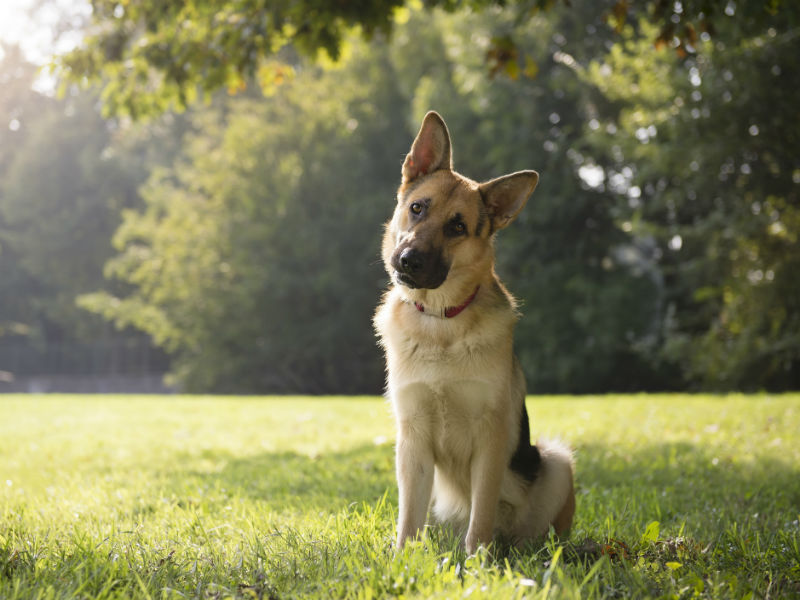In our modern digital age, we often turn to the Internet for things we don't know the answer to. And this of course, includes all our dog-related questions!
As any dog owner knows, sometimes your dog is doing something, like watching TV, and you want to know why it is that he does that.
So you ask Google. And lucky for us, Google has shared the top 10 dog questions of 2016 with People. Want to know what your fellow dog owners are wondering about? Some of the questions may surprise you. Check out the list (and the answers!) below.
1. How long are dogs pregnant?
This answer is more complicated than you may think. However, the normal gestation period in dogs is approximately 63 days from conception, although this can vary. Compared to humans, however, this nine weeks for dog pregnancy is pretty short.
Learn more: How Long Are Dogs Pregnant?
2. Was Goofy a dog?
Although an anthropomorphic one, Goofy is in fact, a dog. He was first introduced to the world in 1932 on a cartoon called “Mickey's Revenue.” In this cartoon, he was known as Dippy Dawg.
Do you know what cartoon dog is AKC-registered? Find out here.
3. Why does my dog lick me?
Your dog might offer up some kisses for a few reasons. It could be because you taste good, they're “rewarded” for it, or even to show submission. Find out more about why dogs lick here.
4. How can you tell how old a dog is?
This is a question that is difficult to answer at home and something to consult your veterinarian about. You might be able to distinguish an older dog from a younger one because of gray hairs on his muzzle or paws. In general though, smaller dogs live longer than larger dogs.
Want to know how to calculate dog years to human years? Find out here.

5. What happens when a dog eats chocolate?
Chocolate contains stimulants called methylxanthines, specifically theobromine and caffeine. These chemicals can wreak havoc on your dog's metabolic processes, resulting in chocolate toxicity. Symptoms of chocolate toxicity include vomiting, diarrhea, abnormal heart rhythms, and more.
Dogs are individually sensitive to methylxanthines and therefore, different dogs may react differently to chocolate. Regardless, chocolate is still top of the list on things to keep your dog away from. If you think your dog has eaten chocolate, you should consult your veterinarian immediately.
Learn more about what happens when a dog eats chocolate here.
6. How to get rid of skunk smell on dog?
Every dog owner's worst nightmare: your dog getting sprayed by a skunk. If it happens, you can use this DIY recipe to help get rid of the smell.
- 1 quart of 3% hydrogen peroxide solution (found at any pharmacy or supermarket)
- 1/4 cup of baking soda
- 1 teaspoon of liquid dishwashing soap
You should wear rubber gloves, work the solution into your dog's coat, and wash him thoroughly. Don't leave the solution on his fur for too long since peroxide can bleach his fur. Then rinse completely. You might have to repeat the process more than once.
Check out our full advice on What to Do if Your Dog Gets Sprayed by a Skunk.
7. How to stop a dog from barking?
Barking is a completely natural behavior in dogs. Sometimes, however, barking can be disruptive, especially if your dog is barking when you're not home. In order to prevent unnecessary barking, you have to determine why your dog is parking at what you consider inappropriate times.
If your dog barks when you leave and aren't at home, separation anxiety might be the cause. If he's barking at nothing, he might be bored. A few simple training tactics, like positive reinforcement and lots of exercise can help you solve these issues. Learn more about those here.

8. Can you put Neosporin on a dog?
Always call your veterinarian in case of emergency. It might be good to carry antibiotic ointment, like Neosporin, in your first-aid kit, just in case. However, the best course of action is ALWAYS to call your vet.
9. How to get rid of fleas on my dog?
Lucky for you, we have a whole guide on how to get rid of fleas in just four steps. Bottom line: the best way to get rid of fleas is to prevent them in the first place. Flea and tick preventatives kill fleas that come in contact with your dog. If your dog does get fleas, however, you may need a prescription preventative or flea shampoo.
10. How much Benadryl can I give my dog?
Before giving Benadryl to your dog, you should consult your veterinarian about your dog's symptoms. If your veterinarian thinks Benadryl may help your dog, he should also be able to help you determine the correct dosage.
The Merck Veterinary Manual recommends administering 2-4mg of Benadryl per kilogram of body weight, two to three times a day. However, this dosage can vary depending on your dog’s existing medical conditions.
For more information on Benadryl and dogs, check out our article here. Again though, the best person to help answer questions like these is your veterinarian.
Have a question that wasn't in the top 10 of 2016? Check out AKC.org/content for articles on health, training, general care, and more!


